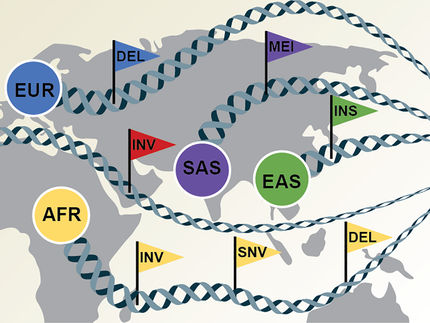Cavalier King Charles spaniels carry more harmful genetic variants than other breeds
Genomic study also identified genetic variants linked to a common heart condition in the breed
Recent dog breeding practices have loaded up cavalier King Charles spaniels with disease-causing mutations, including variants linked to the common heart condition, myxomatous mitral valve disease (MMVD). Erik Axelsson of Uppsala University and colleagues published these new findings September 2nd in the journal PLOS Genetics.

Symbolic image
pixabay.com
The past 300 years of dog breeding have created an incredible diversity of breeds with various sizes, shapes, and abilities. Unfortunately, this process has also caused many breeds to become more inbred and more likely to inherit genetic diseases. The study's researchers wanted to know whether recent breeding practices had increased the number of disease-causing variants in dogs. They sequenced entire genomes from 20 dogs from eight common breeds, such as beagles, German shepherds, and golden retrievers. They found that the cavalier King Charles spaniel, which experienced the most intense breeding, carried more harmful genetic variants than the other breeds they examined.
The researchers also looked for genetic variants in the cavalier King Charles spaniel genomes linked to MMVD. In this condition, the mitral valve in the heart degenerates, allowing blood to leak from the left ventricle back into the left atrium. They identified two genetic variants linked to the disease, which appear to regulate a gene that codes for a common protein in heart muscle. The findings offer a potential explanation for why the cavalier King Charles spaniel is predisposed to develop the disease.
The especially large number of potentially harmful genes in the genomes of cavalier King Charles spaniels, compared to other dogs, likely resulted from its breeding history. Records suggest that small spaniel-type dogs have existed for at least 1,000 years and were popular at royal courts for several hundred years throughout Asia and Europe, including at the court of King Charles II (1630-1685). These spaniels experienced several "bottlenecks" where only a small percentage of the population passed on their genes to the next generation. The bottlenecks may have made the harmful genes more common in the cavalier King Charles spaniel genome before the dog achieved recognition as a breed in 1945.
Axelsson adds, “We find that recent breeding may have led to an accelerated accumulation of harmful mutations in certain dog breeds. In the Cavalier King Charles spaniel specifically, one or several of these mutations affect heart muscle protein NEBL and may predispose this breed to devastating heart disease.”
Original publication
Most read news
Original publication
Erik Axelsson et al.; "The genetic consequences of dog breed formation—Accumulation of deleterious genetic variation and fixation of mutations associated with myxomatous mitral valve disease in cavalier King Charles spaniels"; PLoS Genet.; 2021
Topics
Organizations
Other news from the department science

Get the life science industry in your inbox
By submitting this form you agree that LUMITOS AG will send you the newsletter(s) selected above by email. Your data will not be passed on to third parties. Your data will be stored and processed in accordance with our data protection regulations. LUMITOS may contact you by email for the purpose of advertising or market and opinion surveys. You can revoke your consent at any time without giving reasons to LUMITOS AG, Ernst-Augustin-Str. 2, 12489 Berlin, Germany or by e-mail at revoke@lumitos.com with effect for the future. In addition, each email contains a link to unsubscribe from the corresponding newsletter.






















































